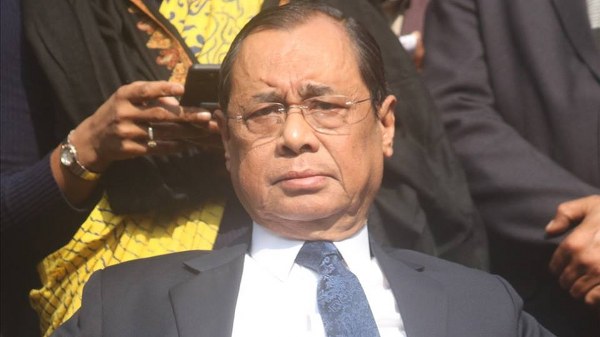5 judges who will deliver the Ayodhya verdict

File Photo
New Delhi: A five-judge Constitution Bench of the Supreme Court will deliver its verdict in Ayodhya’s Ram Janmabhoomi-Babri Masjid title dispute case on Saturday.
The land dispute verdict will be delivered by Chief Justice Ranjan Gogoi, Justice Sharad Arvind Bobde, Justice Ashok Bhushan, Justice S. Abdul Nazeer and Justice D.Y. Chandrachud.
Gogoi, born in 1954, joined the Bar in 1978. He mainly practised in the Gauhati High Court and was appointed as Permanent Judge at the Gauhati High Court in 2001. He was transferred to the Punjab and Haryana High Court in 2010 and was appointed as its Chief Justice the next year.
Gogoi was elevated as a Judge of the Supreme Court in 2012. In October 2018, he was appointed as the Chief Justice of India.
Justice Bobde, born in 1956 in Nagpur, got his B.A. and LL.B. degrees from the Nagpur University. He enrolled on the Roll of the Bar Council of Maharashtra in 1978. Bobde practised law at the Nagpur Bench of the Bombay High Court with appearances at Bombay before the Principal seat and also before the Supreme Court of India for over 21 years.
He got designated as a senior advocate in 1998 and was elevated to the Bench of the Bombay High Court as Additional Judge in 2000. Bobde was sworn in as the Chief Justice of the Madhya Pradesh High Court in 2012 and was elevated as a Judge of Supreme Court in 2013. His retirement is due in April 2021.
Bobde will be the next Chief Justice of India, taking charge on November 18 as Justice Gogoi demits office on November 17.
Justice Bhushan, born in 1956 in Jaunpur, Uttar Pradesh, graduated in Arts in 1975 and obtained a Law Degree from the Allahabad University in 1979. He enrolled as an Advocate with the Bar Council of Uttar Pradesh the same year. Thereafter, he started to practice on Civil and original side at Allahabad High Court till his elevation to the Bench.
He was elevated as the permanent Judge of the Allahabad High Court in 2001 and sworn in as the Judge of the Kerala High Court in 2014. He was elevated as the Judge of the Supreme Court in 2016.
Justice Nazeer, born in 1958, got enrolled as an Advocate in 1983. He practised in the Karnataka High Court and was appointed as an Additional Judge there in 2003. The next year, he was appointed as a Permanent Judge. He was elevated as a Judge of the Supreme Court in 2017.
Justice Chandrachud, who was appointed as a Judge of the Supreme Court in 2016, was the Chief Justice of the Allahabad High Court in 2013. He was appointed as the Additional Solicitor General in 1998. He practised law at the Supreme Court of India and the Bombay High Court. A Delhi University graduate, Chandrachud obtained LLM degree and a Doctorate in Juridical Sciences (SJD) from Harvard Law School, US. He was born in 1959.
The Supreme Court verdict on the Ayodhya title suit comes nine years after the 2:1 judgement of the Allahabad High Court that ordered a three-way division of the disputed 2.77 acres of land between the three parties — Ram Lalla, Sunni Waqf Board and the Nirmohi Akhara.
By IANS




